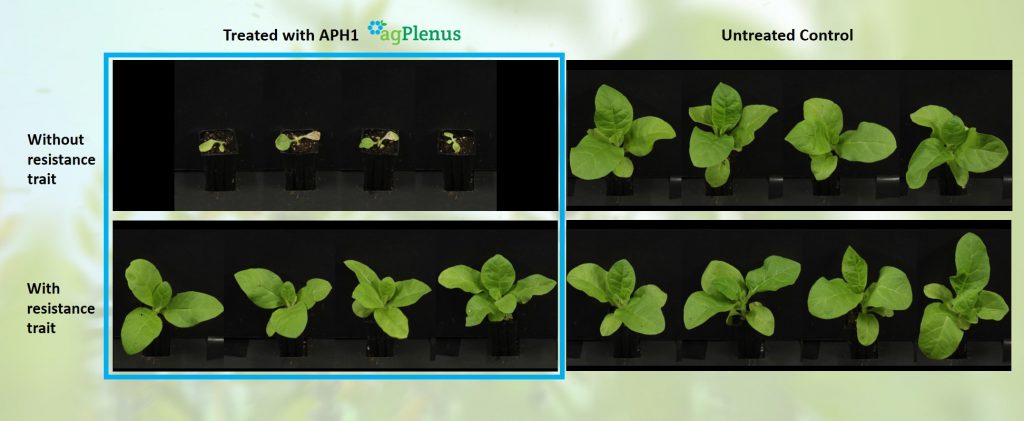Rehovot, Israel
July 6, 2021
Greenhouse proof-of-concept testing demonstrates resistance of modified model plants to AgPlenus’ APH1 herbicide candidate
AgPlenus Ltd., a company designing effective, sustainable crop protection products by leveraging computational biology and chemistry, and a subsidiary of Evogene Ltd. (NASDAQ: EVGN, TASE: EVGN), announced today that it has achieved positive results in a Proof of Concept (POC) testing of a resistance trait for its leading novel Mode-of-Action (MoA) herbicide product candidate, APH1.
 Greenhouse testing of APH1 – modified tobacco plants with resistance trait vs unmodified control
Greenhouse testing of APH1 – modified tobacco plants with resistance trait vs unmodified control
The preferred agricultural practice in field crops is utilizing herbicides that only affect weeds, and not the commercial crop. Among other benefits, this allows farmers to apply the herbicide during the growing season without risk to the commercial crop. Therefore, there is importance in developing herbicides to which commercial crops have inherent tolerance, or for which resistance can be developed. Today’s announcement focuses on the progress in developing a resistance trait to AgPlenus’ leading herbicide candidate, APH1.
As previously disclosed, in earlier studies, APH1 demonstrated effective control over a broad panel of weeds at commercial dose rates, including control over weeds that are known to have resistance to existing herbicides.[1] The achievement of the milestone now being reported follows the conclusion of greenhouse tests demonstrating that model plants modified with a resistance trait, and treated with APH1, were resistant to it, showing no damage after application. These results indicate the potential for developing commercial crops with herbicide resistance to APH1, expanding its potential use to additional commercial crops. As previously disclosed, corn and other cereals already exhibit inherent tolerance to APH1, while additional important target crops, such as soybean, do not. Therefore, development of a resistance trait to APH1 can facilitate the potential offering of APH1 to those additional crops.
Herbicides play an important role in global food supply, with the global herbicide market estimated to reach $34 billion in 2022.[2] Over the last several decades, the increasing use of existing MoA herbicides, along with the extremely limited introduction of new MoA herbicides, has resulted in weeds that are developing increased resistance to the currently available commercial products. The key solution to the emergence of herbicide-resistance in weeds is the development and application of new MoA herbicides.[3]
AgPlenus’ herbicide program focuses on the discovery and targeting of new MoAs to overcome herbicide resistance issues. AgPlenus’ herbicide candidate APH1 is the first chemical compound addressing a novel MoA from this program to reach the ‘Lead’ stage.1 This MoA is not present in higher organisms such as mammals, which may favorably impact its potential safety profile.
In parallel, AgPlenus is working on developing crops resistant to its new MoA herbicides, to expand the potential of their commercial application. Crops that are resistant to herbicides enable the implementation of weed management practices that improve yield and profitability while lowering the environmental impact.[4] The use of herbicide resistant crops is a common practice in the U.S., and approximately 90% of the soybeans and corn grown in the U.S. are resistant to existing commercial herbicides.[5]
To achieve this POC, AgPlenus transformed tobacco plants to express a protein that made them resistant to APH1. These modified plants were grown in a greenhouse and sprayed with a high dose of APH1, equivalent to 2 kg/ha. Modified tobacco plants showed no harm from this application while the control plants were heavily damaged.
The next step in the development of a resistance trait is to attempt to modify soybean plants to establish resistance to APH1 in this important commercial crop.
Douglas Eisner, CEO of AgPlenus, stated: “The results of this POC experiment demonstrate the feasibility of developing seeds for commercial crops that are resistant to our herbicide candidate, APH1, potentially broadening the market for APH1 to a wider range of crops. AgPlenus intends to leverage the success of this POC experiment to expand our product offerings. We are looking forward to the next developmental stage, moving from the model tobacco plant to soybean plants, representing an important potential market segment for APH1.”
Ofer Haviv, Chairman of AgPlenus and CEO of Evogene, stated: “I am excited to see AgPlenus achieve such a significant milestone in the development of one of the most desired products in crop protection – a new MoA herbicide and a seed that is resistant to it. This success is most certainly the result of AgPlenus’ unique computational approach to crop protection development, based on the use of Evogene’s ChemPass AI engine. I look forward to seeing the continued development of these product candidates and others in the coming year.”
***
About AgPlenus Ltd.
AgPlenus is designing effective and sustainable crop protection products by leveraging predictive biology and chemistry. The Company aims to develop crop protection products: herbicides, insecticides, fungicides and crop enhancers. AgPlenus has ongoing collaborations with industry leaders such as BASF and Corteva. AgPlenus is a subsidiary of Evogene Ltd. (NASDAQ: EVGN, TASE: EVGN). For more information, please visit www.agplenus.com.
About Evogene Ltd.:
Evogene (NASDAQ: EVGN, TASE: EVGN) is a leading computational biology company focused on revolutionizing product discovery and development in multiple life-science based industries, including human health and agriculture, through the use of our broadly applicable Computational Predictive Biology (CPB) platform. The CPB platform, incorporating a deep understanding of biology leveraged through the power of Big Data and Artificial Intelligence, has been designed to computationally discover and uniquely guide the development of life-science products based on microbes, small molecules and genetic elements. Utilizing the CPB platform, Evogene and its subsidiaries are now advancing product pipelines for human microbiome-based therapeutics through Biomica Ltd., medical cannabis through Canonic Ltd., ag-biologicals through Lavie Bio Ltd., ag-chemicals through AgPlenus Ltd., and ag-solutions for castor oil production through Casterra Ag Ltd. For more information, please visit www.evogene.com.